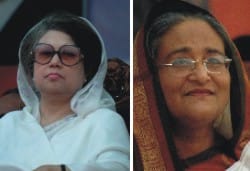Who will have the last laugh?

Who will be laughing after December 29? Photo: Munir Uz Zaman/ Drik News
A hiatus of two years after despicable rule has done wonders by resuscitating a comatose BNP back to life. During the period, much of its misdeeds and miasma have been buried under the thick crust of the shifting sands of time and obfuscated by the nation's collective amnesia. None of the excesses perpetrated by the so- called Hawa Bhaban is put to question; neither is the high-handedness of Tariq Zia or Babar a subject of scrutiny anymore.
Most of the party heavyweights have washed their hands off the dirt they collected while plundering the country. The scripted election on January 22, 2007, planned by BNP-Jamaat regime is now a forgotten chapter of our chequered history. Overtaken by the current woes and travails as well as problems and challenges the people tend to ignore what happened in the foggy past.
Yet, notwithstanding the authority's compromise in giving the BNP still more time, as demanded by the BNP leadership as precondition for joining the election, has to been seen in national perspective and evaluated thus. It is no mean achievement to be able to rope in this important political party in electoral the process to make it credible.
There is no denying the fact that involving the BNP in the election is an essential requirement for that credibility. Now, with the BNP participation assured, one can fret and fume, with regard not only to election but also to the entire political process underway, at one's own peril.
By all appearances, the election is now irreversible. The only Herculean task the government and the EC are now left with is conducting the election, which, in the context of raging militancy in the region, may be fraught with risks. However, with vote casting day exactly a month away, the staple of any political discourse today is the electoral prospects of the parties. Precisely, public interest is now fixed on the question: who will have the last laugh?
In absence of scientific and methodological psychology in the country forecasts given out by media outlets are more often than not misleading, although we depend on them. The 1991 election result is a case in point. Any prognosis of the result will be still more difficult as the present election is being held on a neatly done-up level playing ground, providing a win-win situation at least for the two major parties. There seems to be no clear-cut favourite or an underdog this time around. Now, for carrying the day, a lot will depend on the respective parties' inherent strength and election strategy.
BNP is a past-master in devising an appropriate stratagem, as reflected in the party's winning more seats in spite of getting fewer popular votes. The AL is known for its huge resources going waste due to its habitual gaffes. The party is already scorned by the country's powerful religious right, while its secular credential also is suspect because of its hobnobbing with a pro-fatwa religious outfit in the past.
Again, saddled with an unwieldy grand alliance subsuming Ershad's Jatiyo party, the AL's prop-people image has been further dented. Being an early starter, the AL was expected to garner some advantage over its rivals. Instead, it is bogged down with nagging demonstrations, tuning violent at times, by the deprived nomination seekers. It did not bode well for the party, and such rebellious acts right in front of Sudha Sadan is by itself a damper for the party at this stage.
The BNP also couldn't produce anything more than a mixed bag. True, the party has been resurrected, but its is still far from being election worthy for a variety of reasons -- the most prominent being the dearth of winnable candidates. But Madam is in full command of the party, dispensing nominations confidently, with strict instructions to her party men to work for the candidates chosen by her. There are no ugly demonstrations by the rebel candidates; neither is there time to organise one. The delayed poll-preparation has been a boon for the party. The BNP-Jamaat has committed voters who, in any event, take it to be a safe bet to vote for the alliance.
But, by taking the relevant factors in favour of and also against the parties, it can be seen that neither the BNP nor the AL has a clear edge over the other. As result, a closely-fought electoral bout is on the cards.

 For all latest news, follow The Daily Star's Google News channel.
For all latest news, follow The Daily Star's Google News channel. 



Comments